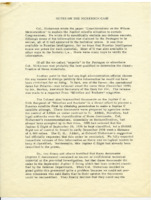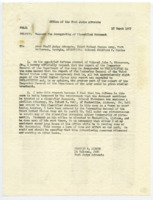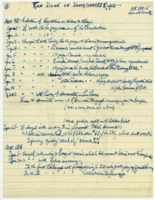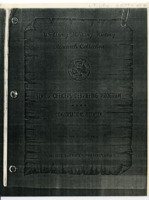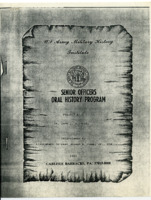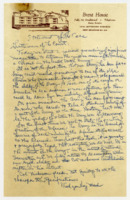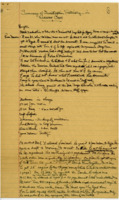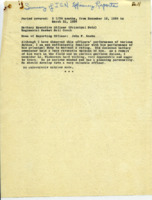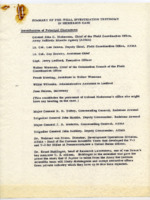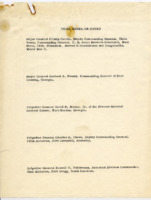
Browse Items (204 total)
Sort by:
-
"Notes on the Nickerson Case."
A typed version and the andwritten notes regarding the Nickerson case. The author is unknown. These notes regard Nickerson's "Considerations on the Wilson Memorandum" and more. -
"Request for Downgrading of Classified Document."
On behalf of the defense counsel, Charles R. Zimmer writes to the Army Staff Judge Advocate, Colonel Clifford F. Cordes, to request that the report of the Inspector General of the Department of the Army be downgraded from classified to unclassified. Zimmer states that he feels without this document being accessible to the defense counsel, the "defense in this case is being hampered." -
"Run Down on Department of Army IG Report."
Various handwritten notes on the Army missile program and other information pertaining to the case of Colonel John C. Nickerson, Jr. -
"Senior Officers Debriefing Program."
A conversation between Lieutenant General Austin W. Betts, Colonel Henk, and Colonel Wahle, published as a part fo the US Army Military History Research Collection. This conversation details the "Army versus the Air Force difficulties in the late '50's" during the transfer of the missile and space program. This program switch was the basis of the case United States v. Colonel John C. Nickerson, Jr. as Nickerson was in charge of the program. This document contain only the portion relative to Colonel Nickerson. -
"Senior Officers Oral History Program."
A project of the U.S. Army Military History Institute, this contains the interview of Dr. John L. McDaniel by Lieutenant Colonel Joseph W. Camp, Jr. from 1985. The interview is about the US Army's first satellite into space. McDaniel brings up the case of Colonel Nickerson relative to the interview. This document contains only the portion of the interview that mentions Colonel Nickerson. -
"Statement of the Case."
Addressed to the "Gentlemen of the court", this statement outlines the reason for the trial and ends stating, "Colonel Nickerson pleads not guilty to all the charges and specifications." -
"Summary of Investigation Testimony in Nickerson Case."
This is the summary of the testimony of a witness in the Nickerson case. He is referred to as "B" throughout the document. -
"Summary of JCN Efficiency Reports."
Written by John F. Roehm, this report covers a summary of reports of Colonel John C. Nickerson, Jr.'s efficiency from his former Battery Executive Officer and regimental basketball boach. -
"Summary of Pre-Trial Investigation Testimony in Nickerson Case."
A list of potential witnesses to give testimony as related to certain important aspects of the case including Nickerson's character and Nickerson's testimony as it stands prior to the trial. -
"Trial Panel or Court."
List of names, locations, and credentials of those who are a part of the trial panel in the case of United States vs. John C. Nickerson, Jr.
